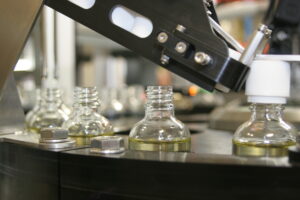The Future of Industrial Automation:
How Custom Solutions Are Reshaping Manufacturing.
The manufacturing sector is in the middle of a transformation. From robotics to data-driven control systems, automation is no longer just an upgrade, it’s the standard for staying competitive. But the real game-changer? Custom automation that fits your unique process like a glove.
In today’s fast-paced world, manufacturing is changing faster than ever. New technologies, smarter machines, and the demand for higher efficiency are pushing industries to rethink how they operate. One of the biggest game-changers in this transformation is custom industrial automation. Unlike traditional “one-size-fits-all” solutions, custom automation is all about designing systems that match the exact needs of a business. This approach is not only improving productivity but also making manufacturing more flexible, cost-effective, and future-ready.
Why Custom Automation is the Future
For decades, automation in manufacturing meant installing standard machines and adapting your processes to fit them. But times have changed. Every manufacturing plant has unique workflows, products, and challenges. That’s where custom automation steps in, solutions designed to fit your operations, not the other way around.
Some key benefits include:
- Higher efficiency – Custom systems streamline your specific workflow, eliminating unnecessary steps.
- Better product quality – Precision tools and tailored processes reduce errors.
- Scalability – Your automation can grow as your business grows.
- Cost savings – While initial investment may be higher, long-term maintenance and downtime are reduced.
The Role of Advanced Technologies
Custom industrial automation is powered by innovations like:
- Robotics & AI – Smart robots that learn and adapt to new tasks.
- IoT (Internet of Things) – Real-time data tracking to optimize performance.
- Machine Vision – Automated inspection systems that catch defects instantly.
- Predictive Maintenance – AI-driven alerts that prevent breakdowns before they happen.
These technologies work together to make manufacturing smarter, faster, and more reliable.
How Manufacturers Are Adapting
Companies across industries, from automotive to food processing, are investing in automation systems designed for their exact needs.
For example:
- A packaging plant using custom robotics to handle fragile products without damage.
- A metal fabrication shop with automated laser cutting tailored to their product sizes.
- A pharmaceutical company with specialized inspection systems to meet strict quality standards.
This adaptability is what’s giving businesses a competitive edge in today’s global market.
What This Means for the Future
Looking ahead, custom automation will become the norm, not the exception. As industries face challenges like labor shortages, rising costs, and sustainability demands, having tailored automation solutions will be the key to staying competitive.
Businesses that embrace this shift now will be in a stronger position to lead the market in the coming years.
Final Thoughts
The future of industrial automation is flexible, intelligent, and custom-built. If your business is still relying on outdated, generic systems, now is the time to explore tailored solutions that can transform the way you work.
Cynertia specializes in designing and delivering custom industrial automation systems that fit your exact needs. Whether you want to upgrade your existing setup or build something from the ground up, our experts can help you move into the future efficiently and confidently.
Contact us today to learn how we can reshape your manufacturing process.

